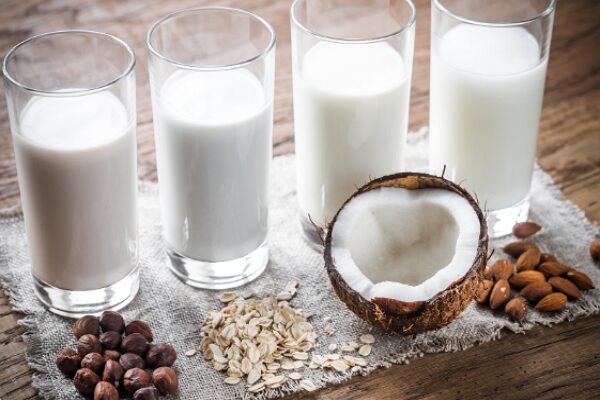Do you like to drink coffee but don’t like the taste of milk? Or thinking of what are the milk substitute for coffee?
Or are you vegan or lactose intolerant and can’t have regular milk in your coffee? There are a lot of different milk substitutes that you can use for coffee.
In this blog post, I will show you my personal choice when it comes to having dairy-free coffee. I will also answer some of the more popular questions related to this topic for you.
So, whether you’re looking for a new way to enjoy your morning cup of Joe or need a dairy-free option, read on for the best milk substitutes for coffee.
Read more: How To Thicken Tomato Sauce For Pizza?
Best Milk Substitute for Coffee

Soy Milk
Soy milk makes a really good substitute for dairy milk when mixed with coffee.
And you can start by swapping these two types of milk with a 1:1 ratio or adjust the ratio based on your own taste.
This substitution is a good choice for many people. It first came out on the way to making tofu.
Today, this can be found in many places as a lactose-free dairy substitute with many health benefits of its own.
It contains minerals, vitamins, and antioxidants that are good for your health. For example, it can help you maintain your DNA and nerve cells. It can also help with tiredness and fatigue when you need it the most. It also has protein and can help keep your muscles and organs healthy. (source)
Almond Milk
Its nutty flavor added a unique twist to the coffee’s taste, and it also frothed nicely when steamed. While I enjoyed the almond milk’s aroma, I noticed that it tended to separate in hot coffee, which was a slight drawback for me.
Additionally, it had a thinner consistency compared to dairy milk, but it worked perfectly well in iced coffee, offering a refreshing alternative for warmer days.
Oat Milk
Wanting to try something creamier, I ventured into oat milk territory. This milk substitute proved to be a game-changer for my coffee experience. Oat milk had a naturally sweet flavor that beautifully complemented the coffee’s bitterness.
Not only did it froth well, but it also created a velvety texture that closely resembled traditional lattes. The best part was that oat milk didn’t separate in hot coffee, making it a fantastic choice for my morning brew.
Coconut Milk
I explored coconut milk as an adventurous option. The coconut flavor provided a tropical twist to my coffee, which I found delightful on certain occasions.
Its rich and creamy consistency worked wonders in creating indulgent coffee drinks, almost like a guilty pleasure. However, coconut milk had a more pronounced flavor, and it might not be for everyone.
Dairy Free vs Non-Dairy

As a coffee enthusiast with a lactose intolerance, the difference between “dairy-free” and “non-dairy” has been a crucial aspect of my coffee journey. Understanding these terms helps me make informed choices while searching for the perfect milk substitute to elevate my coffee experience.
“Dairy-free” refers to products that do not contain any ingredients derived from milk or milk-producing animals, such as cows, goats, or sheep. This includes milk, cream, butter, cheese, and other dairy-based products. For those who are lactose intolerant or have milk allergies, dairy-free options are essential to avoid any adverse reactions. Dairy-free milk substitutes, like almond milk, oat milk, soy milk, and coconut milk, are popular choices to enjoy coffee without compromising on taste or texture.
On the other hand, “non-dairy” products might not contain milk or dairy ingredients, but they could still be processed in facilities that handle dairy products. In some cases, non-dairy products might also contain casein or whey, which are milk proteins but have had the lactose removed. These products are generally suitable for people who have mild lactose intolerance but might not be suitable for those with severe lactose sensitivity or milk allergies.
For someone like me, who needs to avoid all traces of dairy to prevent any discomfort or health issues, choosing dairy-free products is crucial. Non-dairy options might not always be safe if they have any potential for cross-contamination or hidden dairy-derived ingredients.
When it comes to coffee, opting for dairy-free milk substitutes provides a wide array of flavors and textures to suit individual preferences. From almond milk’s nutty notes to oat milk’s creamy richness, soy milk’s versatility, and coconut milk’s tropical touch, dairy-free options offer a world of possibilities to elevate the coffee experience without compromising on dietary needs or ethical choices.
Is it Bad to Add Milk to Coffee?
No, it is good with coffee. It makes your coffee sweet and reduces bitterness. When it is heated, it turns into a better-tasting one with more protein. (source)
What is a Coffee with Milk Called?
A latte is a type of coffee that has espresso and steamed milk. Caffe latte or caffelatte means “coffee and milk” in Italy. (source)
Why Do I Feel Sick After Drinking Coffee with Milk?
Coffee is not good for the stomach of some people. If you drink it, it can make you feel nauseous.
Milk and sweetener make the coffee worse. Artificial sweeteners also upset your stomach’s natural microbiome, which can be bad for your tummy. (source)
Is it Better to Drink Coffee Black or With Milk?
You should drink black coffee if you want to lose weight. There are 4.7 calories in a cup of black coffee, but 56.6 in a cup of coffee with milk and sugar. (source)
What is the Point of Frothing Milk for Coffee?
This is a process that makes foam or froth. It helps the drink to be creamy and airy.
What is Coffee without Milk Called?
Black coffee as there are just coffee and water. (source)
How do New Yorkers take their Coffee?
People in New York City often drink coffee with no milk or sugar. People who live in New York City for a long time can order a regular coffee, which is coffee with milk and sugar. I went to another place out west where they serve black coffee, even if you ask for regular coffee. (source)
What is the Difference between Latte and Coffee with Milk?

Cappuccino has a lot of espresso and milk. Latte has more milk than espresso. Cappuccino is layered while the latte is mixed together.
What is Coffee with Foam Called?
Coffee with foam is called “crema.” Crema is a thick and creamy mixture of coffee and milk.
This is what you will see on top of an espresso shot while it’s brewing. (source)
How Do the French Make Coffee?
The French make coffee by measuring coffee beans, grinding them, heating the water until it boils, and then letting it cool for a minute.
They mix the water with their French pot and let it steep for 4 minutes. Then they plunge the press. (source)
What is Half Coffee Half Milk Called?
It’s called a Cafe Au Lait. The one at Starbucks is made with half-brewed coffee and half-steamed 2% milk.
Even if you don’t see it on the menu, you can easily ask for one. It’s a drink that most baristas know how to make.
What’s the Healthiest Way to Drink Coffee?
The healthiest way to drink coffee is without anything else.
You should not put sugar in your coffee, either.
Do You Put Milk in Coffee First?
For a plain milk coffee at home, you can put milk in first or last. But for café lattes and cappuccinos, it goes in after the coffee. For layered drinks (with different colored cups), it is easier to pour the milk in first if you want a nice presentation.
[embedyt] https://www.youtube.com/watch?v=7h8mP8JmUL4[/embedyt]
Is Coffee With Milk Bad for Weight Loss?
Yes, this combination is bad for weight loss.
If you want to lose weight, then drink black coffee without milk or sugar.
Does Coffee with Milk Keep You Awake?
Adding milk to your coffee might help you sleep for a longer period of time. If you do not want to add milk, it would be better if you drink black coffee at night. (source)
Can Coffee Make You Gain Weight?
No, coffee alone does not make you gain weight. It may even help you lose weight because it boosts your metabolism and helps with appetite control.
But coffee can stop you from sleeping which might cause weight gain. Coffee drinks are also often high in calories and sugar, so be careful when ordering them. (source)
Why is Coffee Suddenly Upsetting My Stomach?
Your body is not liking caffeine. And you can get a stomach ache from it. It also makes your body produce more acid which can lead to an upset stomach if you drink a lot of caffeine.
Why Does Coffee Make Me Sleepy?
After drinking coffee for a while, the caffeine wears off and so does its effect on the adenosine receptors. When this happens, your body may experience a buildup of adenosine that hits you all at once.
Your body will then start to feel tired because it doesn’t have any more energy from food to help it function well anymore. (source)
Does Milk Coffee Reduce Caffeine?
No, it does not. Milk doesn’t have any ingredients that can be used to reduce caffeine. But adding it to coffee changes the color of the coffee and makes it taste better, which means you want it more often.
Conclusion
In summary, soy milk is a great substitute for dairy milk, not just because it can be lactose-free but also because of the different flavors.
If you want to try soy milk with your coffee next time, start by swapping these two types of milk with a 1:1 ratio or adjust the ratio based on your own taste preference.
Give it a shot.
